Our management
How we operate and lead ethically and sustainably
Cargill in the world
When young William Wallace Cargill decided to buy a small grain storage space in the city of Conover (Iowa, United States) in 1865, he did not imagine that 150 years later, the CargillMacMillan family company would become the largest private capital company in the world. With global headquarters in Minneapolis, Minnesota (USA), Cargill now operates in 70 countries, has 150,000 employees worldwide, earned USD 107 billion in sales and other revenues in 2016, and is recognized for the quality of its products and business ethics.(G4-3, G4-5, G4-6)
Today, we are 150,000 employees committed to the company's purpose of being a leader in feeding the world safely, responsibly, and sustainably. By generating and internationally marketing food and agricultural, financial, and industrial products and services fairly and ethically, we contribute to the development and prosperity of our society. (G4-9)
Agriculture
Cargill purchases, processes, and distributes grains and other commodities to manufacturers of food products for human and animal consumption. The company also provides products and services to rural producers and cattle ranchers.
Food
Cargill provides food and beverage manufacturers, foodservice companies, and retailers with high quality products and ingredients.
Industrial
Cargill serves users of energy, saline, starch, and steel industrial products. The company also develops and markets sustainable products using agricultural raw materials.
Financial
Cargill provides financial and risk management solutions to clients in the agricultural, food, financial, and energy sectors worldwide. (G4-4, G4-8)
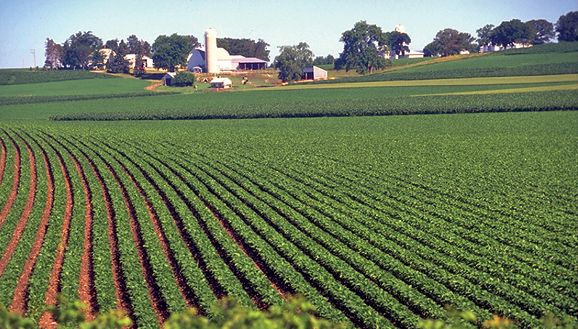
Our value chain
(G4-12)The following infographic shows our contribution to global supply chains.
Our strategic direction
PURPOSE
Cargill will be the leader in nourishing the world in a safe, responsible and sustainable way.
VISION
We will be the most trusted partner in agriculture, food and nutrition.
DIRECTION
We will win through a combination of distinct capabilities, highperforming businesses and bold leadership on issues that shape the future world.
MEASURES
Winning means:
Customers prefer us
Employees choose us
Communities welcome us
Owners ears an attractive return
Cargill in Brazil
In the country since 1965
Is one of the largest food industries in Brazil
9,875 employees
Headquarters in São Paulo
22 factories
6 port terminals
192 warehouses and transshipments
1 Cargill Business Services
2 Innovation Centers
Joint ventures and subsidiaries in 17 Brazilian states and the Federal District
Main Brazilian Units

How we operate
Ethical Principles
(G4-56)
“… our word is our bond.”
– Mr. John MacMillan, 1923
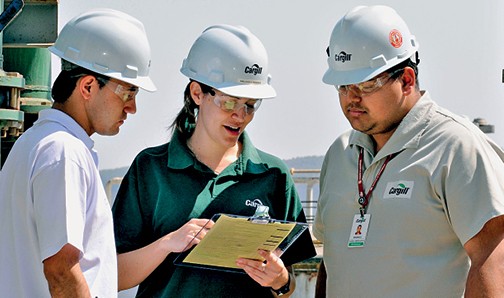
Ethics has conducted Cargill's success over its 150-year history. Its solid leadership position in the global market is built daily on the pillars of transparency and respect for our stakeholders: clients, shareholders, employees, and communities. All business carried out in the countries where we operate begin with the principle of fair competition and is promoted fairly and honestly
To ensure these principles, Cargill created the Code of Conduct, which describes the company's ethical and compliance standards for conducting business around the world and guides all 150,000 employees. Cargill also developed the Supplier Code of Conduct, which determines the ethical standards required throughout its value chain.
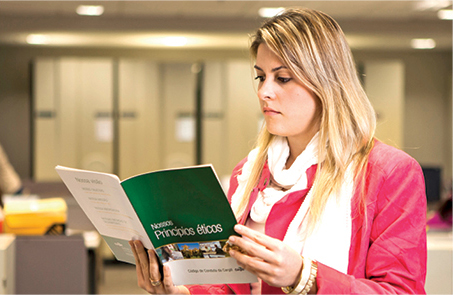
Ethics is the guiding thread of our success. We build our global leadership based on transparency and respect.
Learn about the seven ethical principles that govern our performance worldwide:
1. WE OBEY THE LAW
Complying with the law is the basis of our reputation and our ethical principles. As a global organization privileged for doing business around the world, we are responsible for complying with all laws applicable to our business.
2. WE CONDUCT OUR BUSINESS WITH INTEGRITY
We are proud to conduct our business with integrity. We face competition vigorously, but ethically and fairly. We do not offer or accept bribes or inappropriate gifts, and we comply with laws and regulations that support fair and integral market competition.
3. WE KEEP ACCURATE AND HONEST RECORDS
Accurate and honest records are critical to proper business decision-making and to maintaining the integrity of our financial reports. Business information, in any form, should reflect the actual nature of our transactions.
4. WE HONOR OUR BUSINESS OBLIGATIONS
Throughout the entire history of Cargill, our business relationships have been based on mutual trust. We gain and maintain the trust of our clients and other business partners by communicating with transparency, respecting the information entrusted to us as part of our commitment to the relationship.
5. WE TREAT PEOPLE WITH DIGNITY AND RESPECT
We reach our goals through people. We provide a safe workplace and value the unique contributions of our global team, enabling those who support Cargill's goals to achieve their own individual potential.
6. WE PROTECT CARGILL'S INFORMATION, ASSETS, AND INTERESTS
We count on everyone to manage the organization. To preserve the value of Cargill, we protect the information and assets entrusted to us and avoid situations that may allow personal interests to influence our judgment when conducting business.
7. WE ARE COMMITTED TO BEING A RESPONSIBLE GLONAL CITIZEN
The wide range of our operations gives Cargill a share in almost all sectors of society. With our global reach comes the responsibility of understanding and managing our impact. We maintain strict food and environmental safety standards in our operations, and share our global experience and knowledge to help meet economic and social challenges.
How we lead
(G4-34)
Today, Cargill's global leadership is the responsibility of the Executive Board, formed by the president and nine directors, and leads the execution of the global strategies defined by the parent company.
Cargill's senior leadership relies on the support of five standing committees, and in some cases, committees that are created specifically to address certain issues. Executives from Cargill do Brasil, as well as from other parts of the world, make up the corporate committees, ensuring that the specificities of the business at each location are taken into account when creating initiatives and projects.
Currently, the committees are structured as follows:
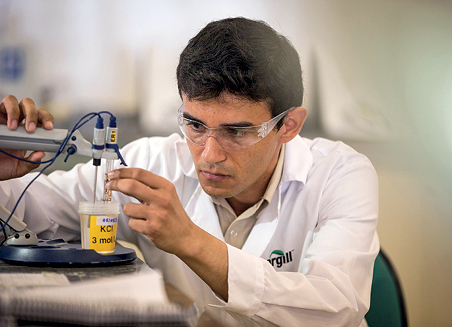
Business Ethics Committee
Works toward compliance with the Code of Conduct and manages risks related to Cargill's brand and reputation. It also defines the company's position regarding public policies and stakeholder relationships, to ensure integrity and transparency when conducting business.
Human Resources Committee
Supports the task of attracting, selecting, and managing talent based on guidelines for promoting diversity and inclusion. The Committee also discusses and reviews policies regarding remuneration, benefits, labor practices, pension fund investments, and career transition initiatives.
Financial Risk Committee
Responsible for defining policies, standards, and procedures for risk management, in order to guarantee the sustainability of the business before the economic and financial factors that may impact operations.
Occupational Health and Safety Committee
Monitors the indicators related to the health and safety of employees, and supports initiatives toward compliance and improvement of safety standards and procedures inside and outside the company.
Sustainability Committee
Operates with the objective of disseminating the sustainability strategy in all areas of the company and in the communities where Cargill is present. Currently, it is formed by the president and ten other company leaders. In 2016, the group gained important support by including the Director of Animal Nutrition – now the Committee has representatives from all Cargill business units.
Aiming to meet local objectives and needs, two other committees were created in Brazil in 2016:
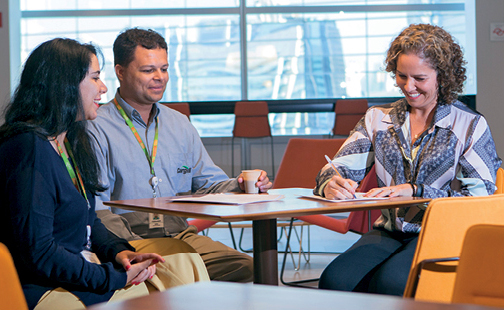
Health Committee
Its main objective is to connect and strengthen Cargill's health initiatives, such as the benefits area, outpatient clinics, and prevention campaigns. With a series of actions planned in partnership with the Human Resources department, the Health Committee seeks to help employees take responsibility for their own health care.
Diversity Committee
A multidisciplinary group with representatives from all areas of Cargill, which aims to build an inclusive work environment that respects human differences. The first actions of the Diversity Committee in 2017 are focused on the gender issue, a global focus of Cargill. However, other aspects of diversity will also have specific actions throughout the year.
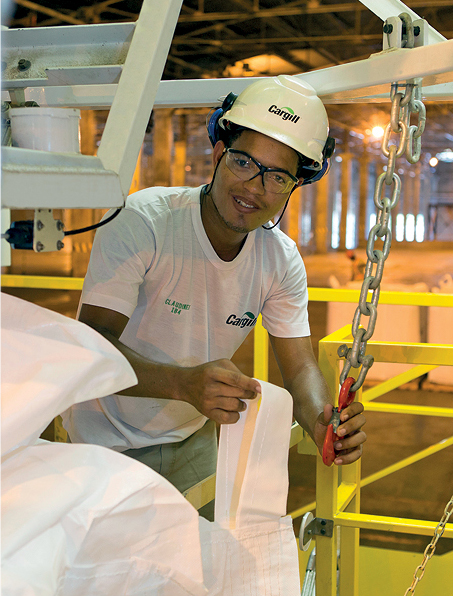
Sustainability management
In line with Cargill's changes in Brazil and the world, and the company's overall purpose, in 2016 the Sustainability Committee defined the strategic vision for its actions up to 2020: to contribute for the company to be recognized as the most reliable source of products and sustainable services. To this end, the Committee's management will be based on four pillars: governance, strategic partnerships, Cargill’s sustainability positioning, and communication and education.
Relevant aspects
Since 2015, the Committee’s working groups have been developing initiatives based on nine aspects of greatest relevance to the sustainability of the company and the regions impacted by our business. They are: land use, water, energy, climate change, best agricultural practices, occupational health and safety, work health and safety compliance, communities, and suppliers.
In 2016, the Committee chose three aspects from this group to focus more intensely and thus concentrate more strongly on its management: occupational health and safety, occupational health and safety compliance, and land use.
Risk management
The risk management system is one of the components of Cargill's business management success. By anticipating risks that may impact operations, we are able to make more assertive decisions, quickly and responsibly.
The main risks monitored are:
Credit risk
Exchange rate and interest rate risk
Liquidity risk
Risk of commodity prices
Risks arising from climate change
The company also has in place Cargill Risk Management (CRM), a business unit responsible for offering solutions in the area of risk management to rural producers and companies in the agricultural sector and the food industry. CRM helps clients protect themselves from market risks when pricing their products, offering differentiated solutions for various agricultural commodities.
